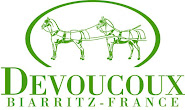A. I think it’s just about balance in life. I am a happy person because I have balance. I have a group of good core friends. I have such a range of friends; a lot of them don’t even know anything about horses. And it’s important to me intellectually to have been curios about different things. I’ve been pretty curious about the world and have been an athletic person and enjoy doing things. Skiing has always been part of my family and growing up I can’t remember learning how to ski I was so little. Like I said, I enjoy athletics and trying new things. I’ve been skeet shooting a couple times and totally enjoyed it. I go golfing with my mom and dad. Not that I’m good at that, but I enjoy it! It’s about keeping a balance in life. I feel like I can tell the horse people that don’t actually have balance.

photo by Emily Daily
To be really good at this sport isn’t just about being a good rider or trainer but also having relationships with sponsors and clients. I’m on the board of governors at the USEA and am a founding member PRO [Professional Riders Organization]. I want to do for my sport. It’s not just about me winning a medal.
There’s a real misconception, and sports psychologists talk about this, that you think if you’re not toiling and miserable then you won’t get better. But that doesn’t actually bring the best out in you. You have to be healthy in your mind and healthy in your body. It’s about balance in your life. For me, I know I train the best and compete the best when I feel relaxed and happy. I can focus when I feel balanced and good in life. Period.
Q. How have you been involved with PRO?
A. I guess everything sort of begins at some point with a little bit of whining or questioning. Like, ugh, we could do this so much better. Or, these warm up areas are so dangerous. You keep noticing all these things. A trigger was Red Hills a couple years ago. There was just craziness on the Chronicle [of the Horse] chat room and negative stuff. I know it’s a great place for communication but people were talking about stuff that was untrue and because it was written down the rest of the world was taking it as truth. I got to the point where I thought nothing is going to change unless I do something about it. It always seems to be certain instances of a small group of noisy people saying stuff. If it’s true, great. But if it’s not it ends up becoming the truth. I felt like I needed to do something instead of complaining. I don’t have time for whining. If you’re whining, do something about it. We have one of the coolest sports in the world and I know how much my horses enjoy it and how everyone involved enjoys this sport. So I wanted to make it the best it could be. What can we do to improve things? It seemed to be a lot of riders talking and having conversations. Where would we like to see the sport going? What changes would we like to see? It’s not just about a pro tour or prize money. We want to build a better experience for everyone: riders, spectators, organizers, everyone. That’s how PRO became. It’s certainly one of the things I’m most proud of being involved in.

Q. How can eventing fans be involved?
A. Definitely join! There’s a membership level for everyone. We are having a Pro tour that will start at Southern Pines. We’re also doing a Pro/Am which is gonna be really fun. It will be a team competition so one pro and three amateurs will ride together. It’s a team competition so the amateurs get coaching during the event. It should be fun.

photo by Emily Daily
We want to improve sense of community in US. We’re starting a lecture series similar to what they do in Europe. It’s educational but also entertaining. Pippa Funnell does one, a bunch of riders do them. It’s really fun to go and watch, it’s not like auditing a clinic. There are some really cool things going on right now.
I felt like with USEA they were going down bit of bizarre path. We can’t sit back and complain about it if we’re not representing ourselves. The Pro Horseman’s Council started maybe three years ago, now. That’s really improved the balance in the USEA and how decisions are made. There’s a better blend. With PRO we’re filling a huge void between what the USEF has to offer and what the USEA has to do. We’re not working against them. There was some concern that we were trying to go against the USEA and that’s not the case at all. Everybody wants the same thing but if your voice isn’t out there then it’s not going to be considered. So that’s why being in the USEA was important.
It’s not just for pros, it’s for everyone. Everyone should join! Memberships start at $35.
Q. Do have anything else you want to add?
A. One thing, as far as wanting to be the best in any sport whether it’s the sport of eventing or whatever, it’s important to remember why you got into it the first place. It’s important for the Pros too. For the last couple [training session] gallops with Arthur we got to go to this secret spot that’s absolutely gorgeous. And I’m riding this horse who I love in the county. Everyone has to remember why they love this sport. The horses and their wellness are the most important part. Just enjoy your horse.

photo courtesy of Allison Springer
Arthur's-Eye View in England.
Watching Julia Mancuso in the winter Olympics was so cool. She wasn’t supposed to get a silver medal but in the start box she had a big smile and was happy and relaxed and did much better than expected. Do you think she would have been the same if she was stressed out and nervous? I mean, enjoy it.
Thanks for reading, as always. If you want to learn more about Allison check out her website at www.allisonspringer.com or look into PRO and become a member. Tell the rest of Team Three Days Three Ways why it is that you started riding or eventing in the first place by commenting below. I love hearing from you!






































